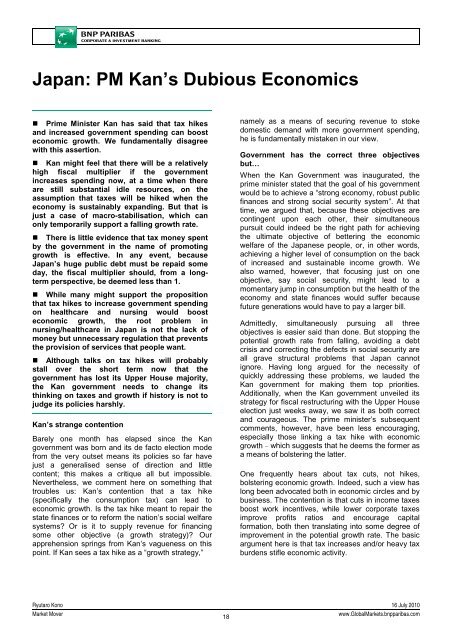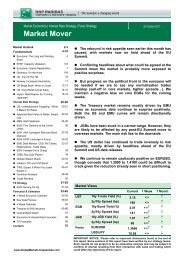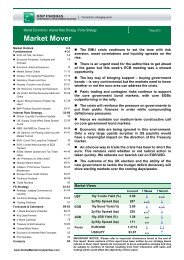Market Economics | Interest Rate Strategy - BNP PARIBAS ...
Market Economics | Interest Rate Strategy - BNP PARIBAS ...
Market Economics | Interest Rate Strategy - BNP PARIBAS ...
Create successful ePaper yourself
Turn your PDF publications into a flip-book with our unique Google optimized e-Paper software.
Japan: PM Kan’s Dubious <strong>Economics</strong><br />
• Prime Minister Kan has said that tax hikes<br />
and increased government spending can boost<br />
economic growth. We fundamentally disagree<br />
with this assertion.<br />
• Kan might feel that there will be a relatively<br />
high fiscal multiplier if the government<br />
increases spending now, at a time when there<br />
are still substantial idle resources, on the<br />
assumption that taxes will be hiked when the<br />
economy is sustainably expanding. But that is<br />
just a case of macro-stabilisation, which can<br />
only temporarily support a falling growth rate.<br />
• There is little evidence that tax money spent<br />
by the government in the name of promoting<br />
growth is effective. In any event, because<br />
Japan’s huge public debt must be repaid some<br />
day, the fiscal multiplier should, from a longterm<br />
perspective, be deemed less than 1.<br />
• While many might support the proposition<br />
that tax hikes to increase government spending<br />
on healthcare and nursing would boost<br />
economic growth, the root problem in<br />
nursing/healthcare in Japan is not the lack of<br />
money but unnecessary regulation that prevents<br />
the provision of services that people want.<br />
• Although talks on tax hikes will probably<br />
stall over the short term now that the<br />
government has lost its Upper House majority,<br />
the Kan government needs to change its<br />
thinking on taxes and growth if history is not to<br />
judge its policies harshly.<br />
Kan’s strange contention<br />
Barely one month has elapsed since the Kan<br />
government was born and its de facto election mode<br />
from the very outset means its policies so far have<br />
just a generalised sense of direction and little<br />
content; this makes a critique all but impossible.<br />
Nevertheless, we comment here on something that<br />
troubles us: Kan’s contention that a tax hike<br />
(specifically the consumption tax) can lead to<br />
economic growth. Is the tax hike meant to repair the<br />
state finances or to reform the nation’s social welfare<br />
systems? Or is it to supply revenue for financing<br />
some other objective (a growth strategy)? Our<br />
apprehension springs from Kan’s vagueness on this<br />
point. If Kan sees a tax hike as a “growth strategy,”<br />
namely as a means of securing revenue to stoke<br />
domestic demand with more government spending,<br />
he is fundamentally mistaken in our view.<br />
Government has the correct three objectives<br />
but…<br />
When the Kan Government was inaugurated, the<br />
prime minister stated that the goal of his government<br />
would be to achieve a “strong economy, robust public<br />
finances and strong social security system”. At that<br />
time, we argued that, because these objectives are<br />
contingent upon each other, their simultaneous<br />
pursuit could indeed be the right path for achieving<br />
the ultimate objective of bettering the economic<br />
welfare of the Japanese people, or, in other words,<br />
achieving a higher level of consumption on the back<br />
of increased and sustainable income growth. We<br />
also warned, however, that focusing just on one<br />
objective, say social security, might lead to a<br />
momentary jump in consumption but the health of the<br />
economy and state finances would suffer because<br />
future generations would have to pay a larger bill.<br />
Admittedly, simultaneously pursuing all three<br />
objectives is easier said than done. But stopping the<br />
potential growth rate from falling, avoiding a debt<br />
crisis and correcting the defects in social security are<br />
all grave structural problems that Japan cannot<br />
ignore. Having long argued for the necessity of<br />
quickly addressing these problems, we lauded the<br />
Kan government for making them top priorities.<br />
Additionally, when the Kan government unveiled its<br />
strategy for fiscal restructuring with the Upper House<br />
election just weeks away, we saw it as both correct<br />
and courageous. The prime minister’s subsequent<br />
comments, however, have been less encouraging,<br />
especially those linking a tax hike with economic<br />
growth – which suggests that he deems the former as<br />
a means of bolstering the latter.<br />
One frequently hears about tax cuts, not hikes,<br />
bolstering economic growth. Indeed, such a view has<br />
long been advocated both in economic circles and by<br />
business. The contention is that cuts in income taxes<br />
boost work incentives, while lower corporate taxes<br />
improve profits ratios and encourage capital<br />
formation, both then translating into some degree of<br />
improvement in the potential growth rate. The basic<br />
argument here is that tax increases and/or heavy tax<br />
burdens stifle economic activity.<br />
Ryutaro Kono 16 July 2010<br />
<strong>Market</strong> Mover<br />
18<br />
www.Global<strong>Market</strong>s.bnpparibas.com
















